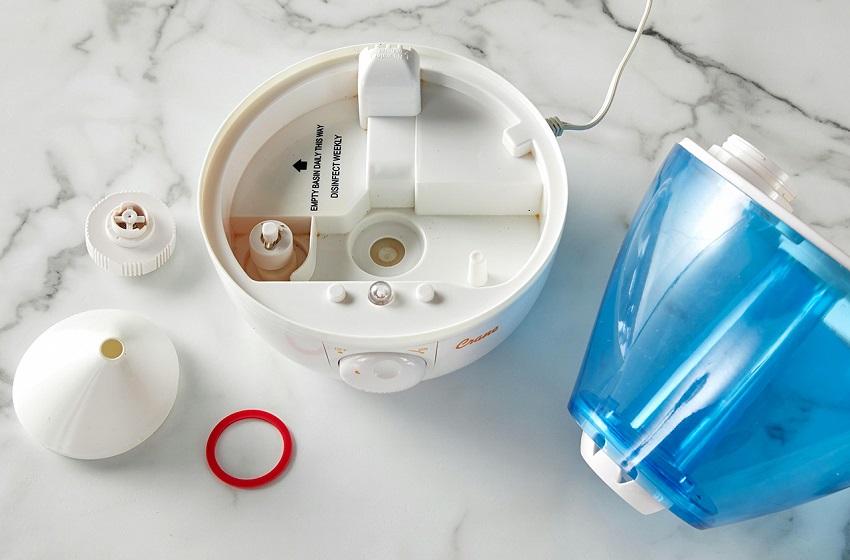
27 Feb How often should you clean your humidifier?
Many women have a humidifier at home, which is the device used to keep the relative humidity of the environment in a closed place constant. This, in addition, contains water that periodically turns into steam. Being a device that serves to increase and adjust the degree of humidity helps us reduce the probability of proliferation of microorganisms that cause infections. But how often should we clean a humidifier that we have at home?
How often should the humidifier be cleaned?
The humidifier should be cleaned on a regular basis. It is recommended to clean it once in three months or so. You can also clean the humidifier using vinegar, but this may cause harm to your skin and health if you use too much of it. You can try the best filterless humidifier to stay healthy.
We simply have to be aware that a device such as a humidifier must always be kept clean, so maintenance must be adequate and constant. Otherwise, it would become a source of bacteria and fungi that would end up causing mold in the space or place. In which we are using it.
Regular cleaning of the humidifier itself once a week should be taken into consideration if we use it very frequently. This will be the only way to avoid bacteria and microorganisms’ proliferation and follow a proper cleaning of the humidifier. You may also like to read How to fill a humidifier?
Why do you have to clean the humidifier regularly?
Water tanks or reservoirs and humidifier filters are, without a doubt, two of the places most likely to grow bacteria and mold if they are not kept properly clean. To keep, for example, the filters clean, the manufacturer’s instructions must be followed and replaced when indicated. However, it is best to do it once every two weeks or even more often if we are aware that it has already become dirty. It will be necessary to disassemble and then wash with plenty of water to remove mineral deposits and wait for it to dry before replacing it.
As for the water in the humidifier, it is important that it be distilled or demineralized. This will contribute to the proper functioning of the equipment and we will be able to keep it cleaner for longer. In the case of the water reservoir (or tank), the ideal would be to clean it every two weeks, just as we did with the filters, although in this case, it will depend a lot on the quality of the water.
The tank must be removed from the appliance to properly access the entire space. This will be cleaned with water and a cleaning product, avoiding detergents. In addition, if it has grounds, it will be submerged in water with a cleaner or with a little vinegar for approximately twenty minutes and rubbed with a brush with very soft bristles. Then it will have to be removed and filled with cold water before placing it back in the humidifier.
Regarding the storage of the equipment, we should be clear that, if the equipment is not going to be used until, at least in a while, we should disconnect it completely before cleaning it properly with a damp cloth. Use the usual cleaner and then dry it with a cloth. Lastly, we should consider replacing obsolete humidifiers and, above all, do it with all those that do not have direct access to the tank because by not being able to access it, it ends up becoming a safe source of storage of microorganisms.
However, and once we are clear about how often we should clean the humidifier, we have to be aware that, depending on where we live and the season of the year in which we find ourselves, the humidifier may be more or less necessary. For example, in the summer and winter seasons, there is a sharp drop in humidity in the air. The problem is that people who are most sensitive to these changes frequently experience breathing difficulties or allergies that appear at nightfall. To cope with this, many people use a humidifier.
Is it really suitable to use it at night in the room?
The truth is that despite taking into account some precautions, having a humidifier in the room both awake and asleep seems to be quite recommendable. However, it will be especially so in cases like these:
– Snoring: The moist air it gives off prevents both the throat and nose from drying out and clears the nostrils, relieving snoring and its intensity.
– Breathing difficulties: Humidification helps prevent nasal dryness.
– Sinusitis: When the air is too dry, the paranasal sinuses do not work properly and, therefore, by adding moisture to the air, we will breathe better in the event that we frequently suffer from nasal congestion.
– Cold, asthma, allergies: Keeps our nostrils lubricated, thus accelerating the healing process. It also helps to clean the air we breathe with which we manage to deal with the discomfort caused, for example, by allergies.
– Body hydration: Thanks to the humidifier (especially if we leave it on all night), we will notice our skin much smoother and more hydrated the next day.
– Reduced risk of infections: This is mainly because bacteria and microorganisms do not travel as easily in an environment where there is humidity.
– Voice: Although it may seem silly, many people claim to wake up with a much softer voice when they sleep with the humidifier. This device prevents the passage of dry air through the vocal cords.
Conclusion
If you have a humidifier, it’s important to make sure that it’s cleaned on a regular basis. Here are some tips for cleaning your humidifier: After using the humidifier, turn off the water valve at the bottom of the unit. This will prevent any water from running out of the filter or evaporator. Remove the filter and clean it with warm water and a mild detergent solution. Rinse well and allow to dry completely before replacing in the unit. When you’re ready to use your humidifier again, fill it up with clean water only!

Sorry, the comment form is closed at this time.